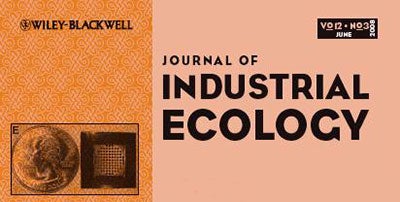Note: Yale School of the Environment (YSE) was formerly known as the Yale School of Forestry & Environmental Studies (F&ES). News articles and events posted prior to July 1, 2020 refer to the School's name at that time.
The Journal of Industrial Ecology (JIE) has introduced a new prize, the Graedel Prize, honoring the best papers by a junior and senior author published in the journal. The prize is named for Yale Professor Thomas E. Graedel in recognition of his vital contributions and pioneering work in the development of the field of industrial ecology.
The annual prizes are being awarded to one paper written by a junior single author or first author and one paper written by a senior single author or first author. The winners of the 2015 Graedel Prize are:
The Journal of Industrial Ecology is a peer-reviewed, international scientific journal on industry and the environment owned by Yale University, headquartered at its School of Forestry & Environmental Studies (F&ES) and published by Wiley-Blackwell.
The annual prizes are being awarded to one paper written by a junior single author or first author and one paper written by a senior single author or first author. The winners of the 2015 Graedel Prize are:
- Junior Author Best Paper: “Comparative Environmental Life Cycle Assessment of Conventional and Electric Vehicles,” written by Troy R. Hawkins, Bhawna Singh, Guillaume Majeau-Bettez, and Anders Hammer Strømman.
- Senior Author Best Paper: “An Exploration of the Relationship between Socioeconomic and Well-Being Variables and Household Greenhouse Gas Emissions,” written by Jeffrey Wilson, Peter Tyedmers, and Jamie E.L. Spinney.
The Journal of Industrial Ecology is a peer-reviewed, international scientific journal on industry and the environment owned by Yale University, headquartered at its School of Forestry & Environmental Studies (F&ES) and published by Wiley-Blackwell.

Graedel, who has served as professor of industrial ecology and director of the Center for Industrial Ecology at F&ES since 1996, will retire in June. Under his visionary guidance, Yale took a leadership role in developing and institutionalizing industrial ecology, including establishing the Journal of Industrial Ecology to become the primary scholarly journal in the field. Graedel published seminal articles and the first textbook on industrial ecology, served as the first president of the International Society for Industrial Ecology (ISIE), and established the Gordon Research Conference on Industrial Ecology.
The winners of the inaugural Graedel Prizes will receive $750 and a free membership in the ISIE. Funding for the prize has been provided by the Raw Materials Group Stockholm, A-1 Recycling, GE, AT&T, and the Nickel Institute.
The paper by Hawkins and colleagues compared conventional vehicles and electrical vehicles (EVs). They compiled new data on the greenhouse gas emissions originating from the production of EVs and provided an especially transparent data set in a research field where key data are often proprietary. The authors found that the relative life cycle benefits of EVs are very sensitive to the carbon intensity of the electricity that is used. The paper generated a global debate over the carbon footprint of EVs and, during the month of its release, it was the most downloaded scientific article published by Wiley, the journal’s publisher.
The authors are affiliated with the Industrial Ecology Programme (IndEcol) at the Norwegian University of Science and Technology (NTNU) in Trondheim, Norway. Troy R. Hawkins, director of Life Cycle Assessment at Enviance in Cincinnati, Ohio, was a postdoctoral researcher with IndEcol when the paper was written. Other authors are Bhawna Singh, Guillaume Majeau-Bettez, and Anders H. Strømman.
The paper by Wilson and colleagues examines the relationship between direct greenhouse gas (GHG) emissions and socioeconomic and well-being variables, with an unprecedented level of specificity based on household energy use survey data and personal travel data verified by geographic positioning systems. The findings challenge hoped-for linkages between emissions and well-being, and between emissions and environmental attitudes — important for public policy.
The authors are collaborators based in Halifax, Nova Scotia, Canada. Jeffrey Wilson is an assistant professor at Dalhousie University. The other authors are Peter Tyedmers at Dalhousie University and Jamie Spinney at Saint Mary's University.
More information about the prizes can be found at: http://dx.doi.org/10.1111/jiec.12288.
The winners of the inaugural Graedel Prizes will receive $750 and a free membership in the ISIE. Funding for the prize has been provided by the Raw Materials Group Stockholm, A-1 Recycling, GE, AT&T, and the Nickel Institute.
The paper by Hawkins and colleagues compared conventional vehicles and electrical vehicles (EVs). They compiled new data on the greenhouse gas emissions originating from the production of EVs and provided an especially transparent data set in a research field where key data are often proprietary. The authors found that the relative life cycle benefits of EVs are very sensitive to the carbon intensity of the electricity that is used. The paper generated a global debate over the carbon footprint of EVs and, during the month of its release, it was the most downloaded scientific article published by Wiley, the journal’s publisher.
The authors are affiliated with the Industrial Ecology Programme (IndEcol) at the Norwegian University of Science and Technology (NTNU) in Trondheim, Norway. Troy R. Hawkins, director of Life Cycle Assessment at Enviance in Cincinnati, Ohio, was a postdoctoral researcher with IndEcol when the paper was written. Other authors are Bhawna Singh, Guillaume Majeau-Bettez, and Anders H. Strømman.
The paper by Wilson and colleagues examines the relationship between direct greenhouse gas (GHG) emissions and socioeconomic and well-being variables, with an unprecedented level of specificity based on household energy use survey data and personal travel data verified by geographic positioning systems. The findings challenge hoped-for linkages between emissions and well-being, and between emissions and environmental attitudes — important for public policy.
The authors are collaborators based in Halifax, Nova Scotia, Canada. Jeffrey Wilson is an assistant professor at Dalhousie University. The other authors are Peter Tyedmers at Dalhousie University and Jamie Spinney at Saint Mary's University.
More information about the prizes can be found at: http://dx.doi.org/10.1111/jiec.12288.
Published
April 23, 2015